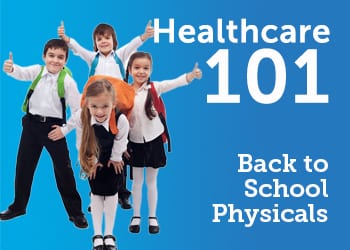Healthcare 101: The Importance of Back to School Physicals
July 1, 2016

Back-to-school season adds a lot of things to a busy parent’s to do list: purchasing school supplies, finding new clothes for your kids, and wrapping up summer programs. Don’t let a school physical fall by the wayside during this busy time. Getting an annual physical can help your child stay healthy and ensure a successful school year!
Importance of the Back-to-School Physical
Late summer often results in a rush to complete back-to-school physicals. Although some schools require an annual physical, particularly if your child is a student athlete, it is a smart idea for all parents to get their child a school physical annually. This is important for a variety of reasons, including:
- Opportunity to check developmental processes During a routine physical, your health professional will check all of your child’s body systems to ensure there are no apparent problems. This allows you to catch any problems early on and get your child the best early intervention resources available.
- Immunizations A routine physical involves checking your child’s immunization records and ensure that he or she is up to date with all required immunizations. This may be required information for your school to admit your child in the fall.
- Safety information Safety behaviors such as wearing a helmet, using a seatbelt, or securing firearms in the home may come up during the course of your child’s physical. These are all good reminders for behaviors that will keep your child safe over the coming years.
- Concerns for student athletes Student athletes may need additional discussion with a health care professional about healthy eating, safe exercise practices or how to manage a physical condition while playing sports.
How to Get the Most from a Back-to-School Physical
The best way to maximize the effectiveness of the school physical is to go in with a plan. Do you have specific concerns about your child’s health or development? Do you feel like he or she may be falling behind in some way? Keep in mind that apparent cognitive or behavioral problems, such as being distracted or disruptive in class, can sometimes have physical origins such as poor eyesight. Think about the following problems:
- Has your child complained of any pain, fatigue, dizziness or digestive problems?
- Have your child’s eating habits changed?
- Does your child seem anxious or depressed?
- Has your child reached important developmental milestones on time?
- Has your child experienced any learning difficulties or other classroom problems?
- How well does your child sleep?
To keep yourself organized and make the most of your time with your CareSpot health professional, make a list of the questions you have about your child’s health. Your clinician will likely address many of these points through the child’s routine physical. However, there will be time for you to ask questions during the exam. Grab a pen and paper to jot down responses to ensure you understand the information presented. Start by booking your appointment online today!
